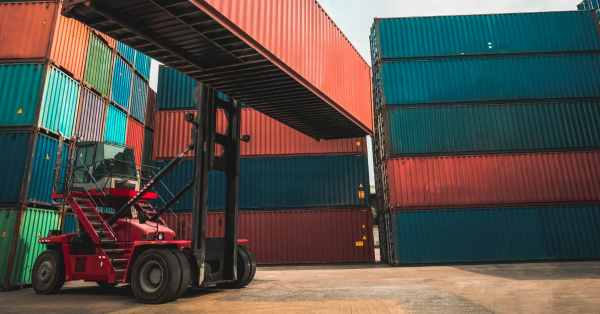Hit enter to search or ESC to close
15 June 2022
Navigating uncertain times in the global cargo market
For the international cargo market, 2021 was a year of congestion, constraint, and confusion. While the situation has now somewhat stabilised, the war in Ukraine and continued pressure on ports and the global supply chain means it is unlikely we’ve seen the last of tough conditions, says Crombie Lockwood marine insurance expert, Michael Gemmell.
When the coronavirus pandemic first struck in 2020, cargo volumes and demand for container goods stayed strong, pushing up freight rates week after week. However, in a world soon hampered by pandemic-related restrictions, global ports and supply chains could accommodate only so much demand and volume. This disruptive environment pushed freight rates even higher.
Chain of chaos deepens
Michael Gemmell says 2021 didn’t bring the respite shipping companies were hoping for.
“The Covid-19 vaccine rollout early in 2021 did little to ease seafarer and port labour shortfalls. Instead, the supply chain crisis deepened, as cases of Covid-19 forced some major ports – especially in China – to temporarily close.”
Michael says that with huge demands on transport workers and a lack of warehousing space, ports still face major challenges to clear containers from site quickly enough.
“In many locations around the world ocean carriers are waiting to enter ports and sailing schedules are in disarray. These inefficiencies are stopping workers from accessing container equipment. This has meant container shipping companies are severely short of containers, which continues to drive freight rates to record highs. The delays are now spilling over to airports, railways and national highways as the pressure to move goods across countries continues to mount.”
And for insurers, this all means a substantial increase in risk.

Ports still face major challenges to clear containers from site quickly enough
Freight rates and container shortages
The increase in freight rates and lack of containers has meant companies have increased the amount of high-value goods being shipped in each container, which has increased insurers’ exposure for each shipment. This is particularly true for pharmaceuticals, which carry high risk due to their susceptibility to theft and temperature management requirements. While robust operating procedures can reduce these risks, avoiding delivery delays is not so easy to control. It’s a conundrum that shows just how complex supply chains can be and exposes areas of risk that are difficult to protect.
War impacts shipping and supply chain
Michael says Russia’s recent invasion of Ukraine has put even more strain on global supply chains. Many cargo ships are stuck either in or around Ukrainian ports, as the country’s military suspended commercial shipping at its docks after the invasion.
The UK has banned Russian ships from calling on its ports, while Maersk, Ocean Network Express, Hapag-Lloyd, and Mediterranean Shipping Company (MSC) have suspended shipments to and from Russia (apart from food and medicine).
“The situation is extremely volatile,” says Michael. “We have seen Lloyd’s and other global cargo insurers pull back coverage.”
Companies operating outside Ukraine ports are able to buy back coverage, with rates varying from insurer to insurer. As the situation remains so unpredictable, quotes are currently only valid for 24 hours and provide coverage for just seven days.
The obvious knock-on effect, says Michael, is shortages of certain commodities and spiralling prices.
Commodity prices soar
Over 600,000 businesses worldwide rely on Russian and Ukrainian suppliers, with over 90% of these in the United States. For now, there’s enough in reserve to mitigate any short-term disruption but if the conflict persists, it won’t be long until demand outweighs supply.
“Russia and Ukraine account for a number of major global exports, including wheat, corn and sunflower oil,” explains Michael. “The situation is causing commodity prices to soar, and they’re expected to spike even further. Many poorer countries are all heavily reliant on Ukrainian grain.
“Russia is also one of the top three oil producers in the world and accounts for around 10% of the world’s oil supply. Europe alone relies on Russia for about a third of its total oil imports. Cutting off that supply means prices are rising dramatically.”
Cargo market outlook
With so much uncertainty in the cargo market, what are the expectations for the months ahead?
“Clients should work with their underwriters to maintain sustainability within the market, so that we don’t see a return to the unpredictability of the recent past,” says Michael.
We expect insurers will hold firm when it comes to setting their terms and policy coverages. It’s also likely that they won’t want to reduce deductibles to pre-2017 norms.”
Top tips for your marine insurance renewal
With your broker
- Check the layering structure of your insurance programme at the start of the renewal process.
- Keep providing underwriters with comprehensive renewal information.
- Meet up with your underwriting panel in person where you can, especially with larger, more complex risks
Our marine insurance brokers advise on, and design insurance programmes to cover companies against international and domestic marine risks. The marine team is well versed in the challenges and complexity of marine insurance, with expertise that ranges from marine cargo and marine hull risks to marine and transport liabilities
Marine insurance specialists
Our experienced marine insurance brokers are here to provide advice and solutions to small-medium and corporate businesses working in and with the marine industry.